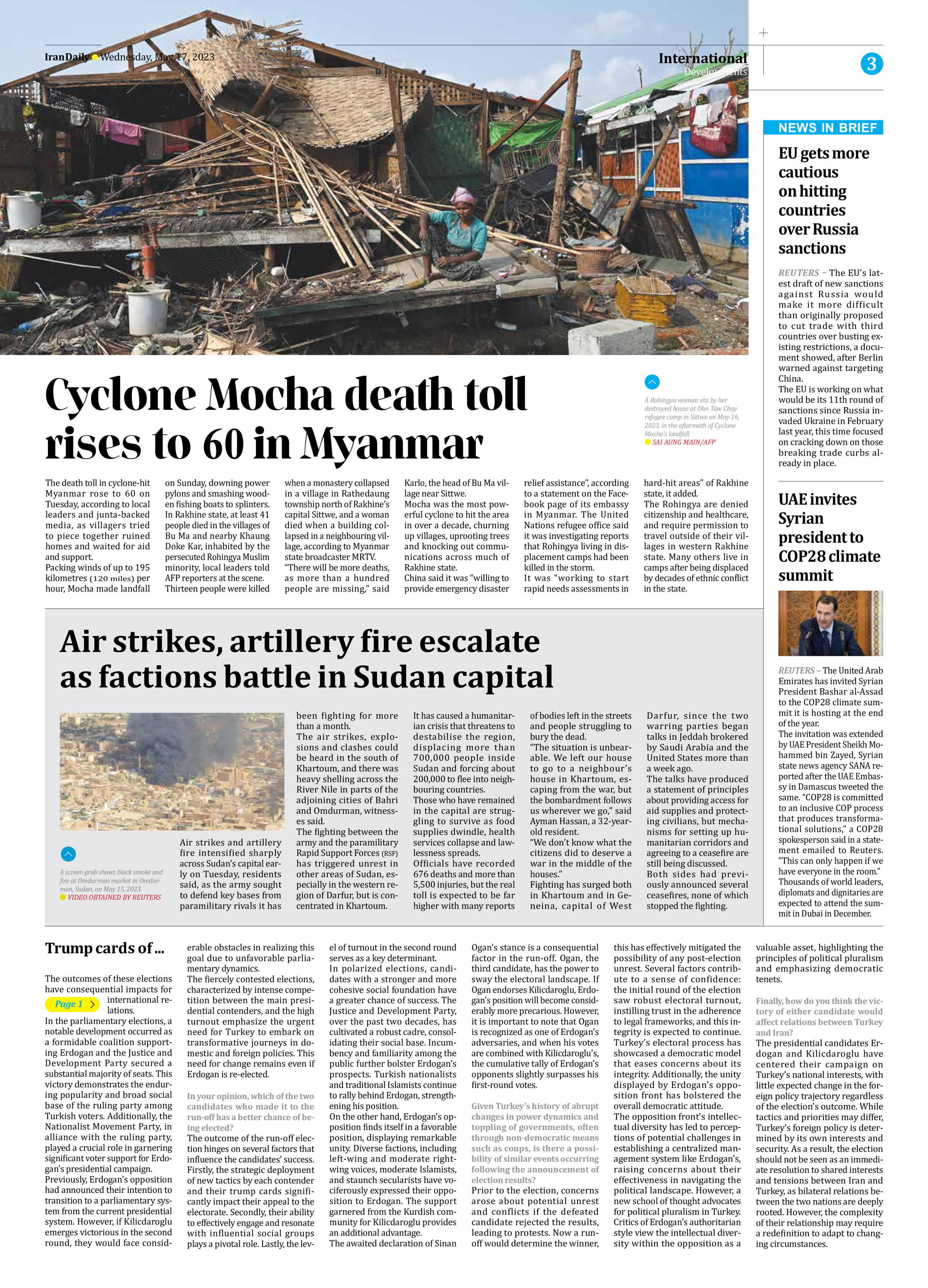
Trump cards of ...
Page 1
The outcomes of these elections have consequential impacts for international relations.
In the parliamentary elections, a notable development occurred as a formidable coalition supporting Erdogan and the Justice and Development Party secured a substantial majority of seats. This victory demonstrates the enduring popularity and broad social base of the ruling party among Turkish voters. Additionally, the Nationalist Movement Party, in alliance with the ruling party, played a crucial role in garnering significant voter support for Erdogan’s presidential campaign.
Previously, Erdogan’s opposition had announced their intention to transition to a parliamentary system from the current presidential system. However, if Kilicdaroglu emerges victorious in the second round, they would face considerable obstacles in realizing this goal due to unfavorable parliamentary dynamics.
The fiercely contested elections, characterized by intense competition between the main presidential contenders, and the high turnout emphasize the urgent need for Turkey to embark on transformative journeys in domestic and foreign policies. This need for change remains even if Erdogan is re-elected.
In your opinion, which of the two candidates who made it to the run-off has a better chance of being elected?
The outcome of the run-off election hinges on several factors that influence the candidates’ success. Firstly, the strategic deployment of new tactics by each contender and their trump cards significantly impact their appeal to the electorate. Secondly, their ability to effectively engage and resonate with influential social groups plays a pivotal role. Lastly, the level of turnout in the second round serves as a key determinant.
In polarized elections, candidates with a stronger and more cohesive social foundation have a greater chance of success. The Justice and Development Party, over the past two decades, has cultivated a robust cadre, consolidating their social base. Incumbency and familiarity among the public further bolster Erdogan’s prospects. Turkish nationalists and traditional Islamists continue to rally behind Erdogan, strengthening his position.
On the other hand, Erdogan’s opposition finds itself in a favorable position, displaying remarkable unity. Diverse factions, including left-wing and moderate right-wing voices, moderate Islamists, and staunch secularists have vociferously expressed their opposition to Erdogan. The support garnered from the Kurdish community for Kilicdaroglu provides an additional advantage.
The awaited declaration of Sinan Ogan’s stance is a consequential factor in the run-off. Ogan, the third candidate, has the power to sway the electoral landscape. If Ogan endorses Kilicdaroglu, Erdogan’s position will become considerably more precarious. However, it is important to note that Ogan is recognized as one of Erdogan’s adversaries, and when his votes are combined with Kilicdaroglu’s, the cumulative tally of Erdogan’s opponents slightly surpasses his first-round votes.
Given Turkey’s history of abrupt changes in power dynamics and toppling of governments, often through non-democratic means such as coups, is there a possibility of similar events occurring following the announcement of election results?
Prior to the election, concerns arose about potential unrest and conflicts if the defeated candidate rejected the results, leading to protests. Now a run-off would determine the winner, this has effectively mitigated the possibility of any post-election unrest. Several factors contribute to a sense of confidence: the initial round of the election saw robust electoral turnout, instilling trust in the adherence to legal frameworks, and this integrity is expected to continue. Turkey’s electoral process has showcased a democratic model that eases concerns about its integrity. Additionally, the unity displayed by Erdogan’s opposition front has bolstered the overall democratic attitude.
The opposition front’s intellectual diversity has led to perceptions of potential challenges in establishing a centralized management system like Erdogan’s, raising concerns about their effectiveness in navigating the political landscape. However, a new school of thought advocates for political pluralism in Turkey. Critics of Erdogan’s authoritarian style view the intellectual diversity within the opposition as a valuable asset, highlighting the principles of political pluralism and emphasizing democratic tenets.
Finally, how do you think the victory of either candidate would affect relations between Turkey and Iran?
The presidential candidates Erdogan and Kilicdaroglu have centered their campaign on Turkey’s national interests, with little expected change in the foreign policy trajectory regardless of the election’s outcome. While tactics and priorities may differ, Turkey’s foreign policy is determined by its own interests and security. As a result, the election should not be seen as an immediate resolution to shared interests and tensions between Iran and Turkey, as bilateral relations between the two nations are deeply rooted. However, the complexity of their relationship may require a redefinition to adapt to changing circumstances.







